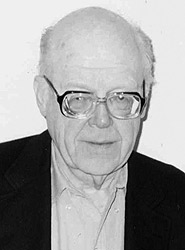Berkeleyan
Obituary
Austin Ranney
![]()
24 August 2006
J. Austin Ranney Jr., an eminent political scientist and leading American authority on political parties and elections, died peacefully at his home in Berkeley on July 24. He was 85 years old, and for a number of years had been battling the debilitating effects of congestive heart failure and diabetes.
 Austin Ranney |
Ranney's teaching career included professorships at the University of Illinois (1947-63), the University of Wisconsin, Madison (1963-76), and UC Berkeley (from 1987), where he was a notably successful chairman of the political science department. He also served on the senior staff of the American Enterprise Institute in Washington, D.C., from 1975 to 1985 and on the editorial board of the AEI journal Public Opinion. He visited on the faculties of Yale, Georgetown, and UC Davis.
Ranney's doctoral dissertation, The Doctrine of Responsible Party Government (1954), and his Jefferson Lectures at Berkeley, "Curing the Mischiefs of Faction" (1975), are major explorations of the role that parties play in the overall scheme of the American political system. During his academic career he made important contributions to studies of democracy and the party system, referendums, presidential primaries, the measurement of party competition, the impact of television on elections, and the recruitment of candidates for public office, among other topics.
Born Sept. 23, 1920, in Cortland, N.Y., Ranney at an early age moved with his family to Corona, in Southern California, where he grew up doing chores at the family creamery. He attended Northwestern University on a debate scholarship, then earned an M.A. from the University of Oregon in 1943. His 1948 Ph.D. was from Yale University.
Long active in the American Political Science Association, he was among the first recipients of its Frank Goodnow Award for service to the profession. For many years Ranney was also a major influence on the work of the Social Science Research Council, serving as chair of its Committee on Governmental and Legal Processes and member of the board of directors and its executive committee. His pioneering work on the selection of parliamentary candidates in Britain, recorded in Pathways to Parliament (1965), led to his election as a corresponding member of the British Academy, and he was an officer of the American Academy of Arts of Sciences, the International Political Science Association, and Pi Sigma Alpha, the political-science fraternity. Two of the universities from which he graduated, Northwestern and Yale, awarded him honorary degrees. He was a Guggenheim Fellow and a fellow of the Center for Advanced Study in the Behavioral Sciences.
Ranney, a loyal "unhyphenated" Democrat, was frequently called upon by his party. He was active in the Humphrey campaign of 1968 and served subsequently on the party's commission on Party Structure and Delegate Selection (the McGovern-Fraser Commission). His other public service included a long term as trustee of the Institute for American Universities of Aix-en-Provence, chairmanship of the Governor's Commission on Registration and Voting Participation in Wisconsin, membership in the Presidential-Congressional Commission on the Political Activity of Government Employees, and as an official observer of referendums in the Trust Territories of the Pacific-Micronesia, including the Marshall Islands. This last experience yielded a book, Democracy in the Islands (1985), written with Howard Penniman. In retirement he presided over Berkeley's Committee on Human Subjects and served on the board of directors of the Cal Retirement Center.
He was a man of eclectic enthusiasms that he loved to share with friends, embracing the local football teams, collegiate and professional, fine wine, good music ,and Civil War history, where his deep expertise led him briefly to appear on a national quiz show. It gratified Ranney that in his lifetime he saw the rehabilitation of U.S. Grant's reputation as a Civil War general.
Ranney was married twice, first to the late Elizabeth MacKay, with whom he had four sons: Jay, Douglas, and Gordon, all of Madison, Wisc., and David, of Cupertino, who survive him along with three granddaughters. His second marriage, in 1976, was to Nancy Boland Edgerton, who, with her sons Scott, of Molalla, Ore., and Bruce, of Reston, Va., also survives him, as does his sister, Harriet Watkins, of La Junta, Colo.
- Nelson Polsby and Raymond Wolfinger

